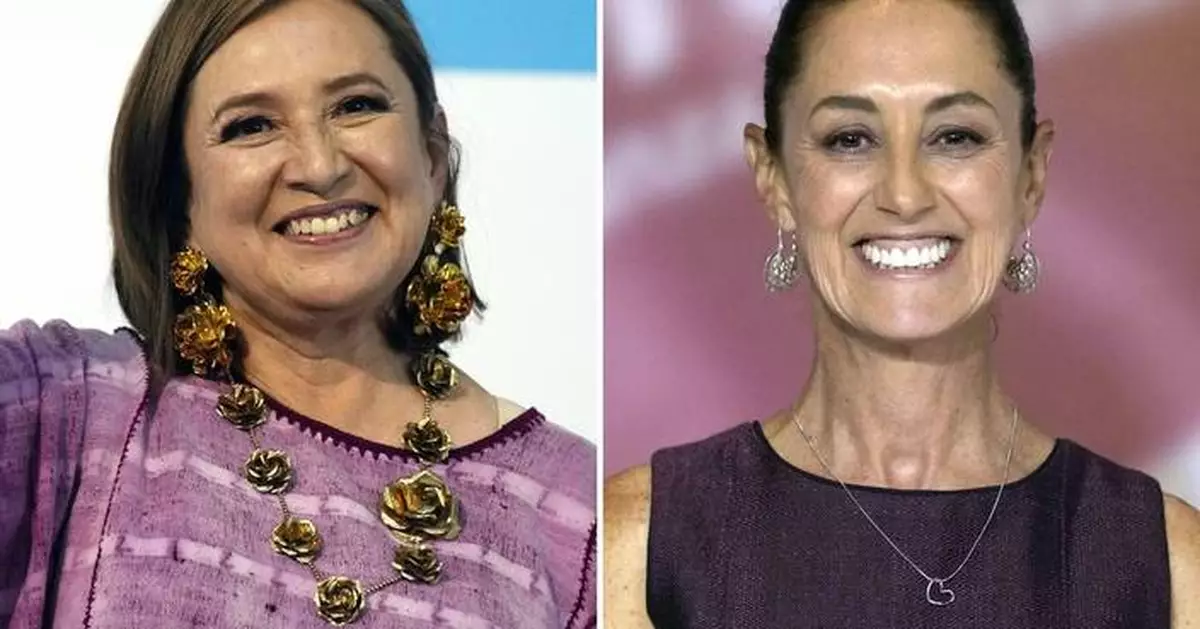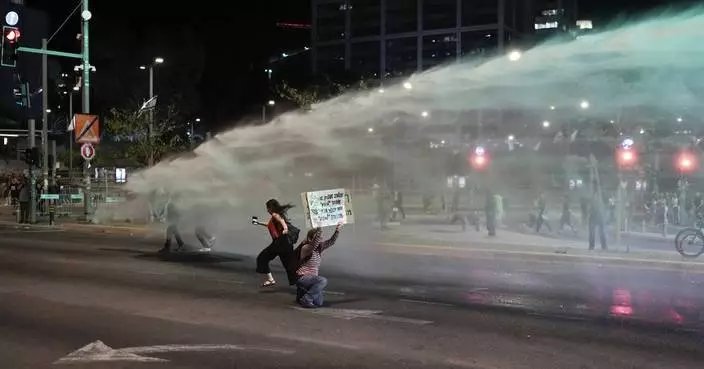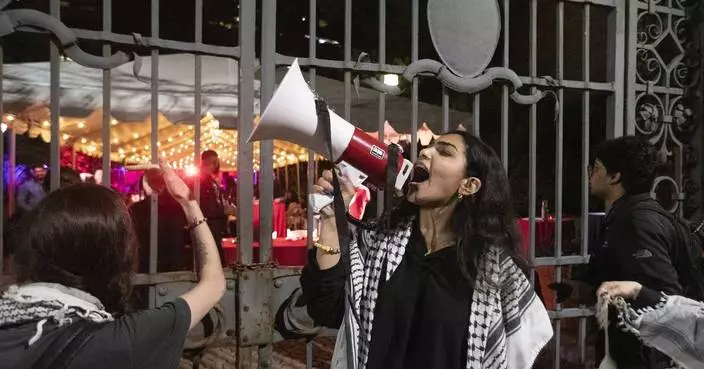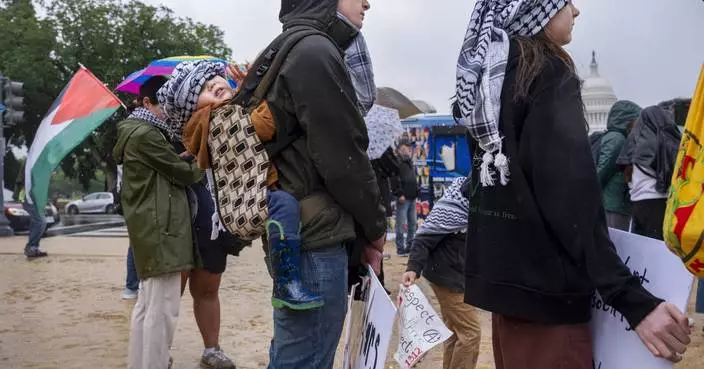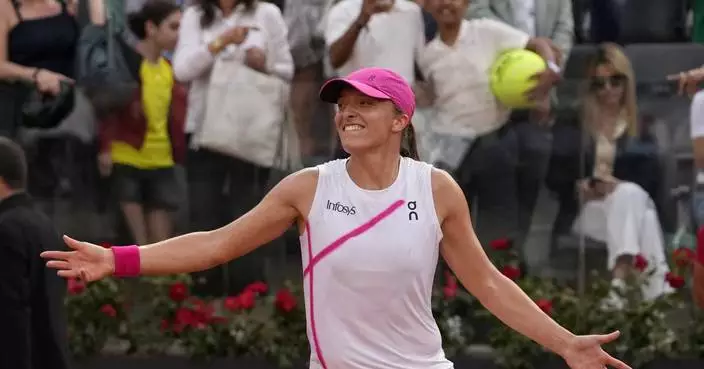MEXICO CITY (AP) — Mexico’s leading presidential candidate repeatedly touted the social programs of outgoing President Andrés Manuel López Obrador and walked a fine line between supporting the national oil company and promising a clean energy transition in the second debate Sunday night ahead of the June 2 election.
Former Mexico City Mayor Claudia Sheinbaum of the president’s Morena party continues to hold a healthy lead over Xóchitl Gálvez of a coalition of opposition of parties and Jorge Álvarez Máynez of the small Citizen Movement party.
López Obrador significantly raised Mexico’s minimum wage and increased spending on social programs, most of which are popular direct cash transfer programs. Sheinbaum has benefitted from her mentor’s popularity throughout the campaign and promised to continue his programs.
She called the model of government that he started and she has committed to continuing “humanist, an honest model, protector of our patrimony, with better salaries, with better pensions, without raising taxes.”
Even Gálvez, Sheinbaum’s most serious competitor, stressed that she, too, would maintain the popular, but costly programs if elected. The former senator and tech entrepreneur reminded voters that she knew poverty growing up and was able advance in part because of a scholarship.
“I am a woman who comes from below, who knows poverty and knows how poverty hurts and the time that it steals from you,” Gálvez said.
Álvarez Máynez, a former congressman, promoted his own initiatives to reduce Mexicans’ work week from six to five days, provide paternity leave and increase vacation. He said that despite the social spending of the current administration, young children receive a fraction of what they should because “they don’t vote.”
On the environment and climate change, Sheinbaum, a climate scientist, pointed to her efforts as mayor, such as putting solar panels on the rooftops of Mexico City’s sprawling wholesale market and adding more electric buses and bike lanes.
As president, she said, she would work to reduce greenhouse gas emissions and help Mexico adapt to climate change. But she also defended López Obrador’s construction of a huge new oil refinery that she said would help Mexico reduce its gasoline imports. She warned that Gálvez would try to privatize the deeply indebted state oil company, known as Pemex.
Gálvez said the private sector would be critical in Mexico’s clean energy transition. She added that Mexico was losing foreign investment opportunities because foreign companies require access to clean electricity produced with renewables. She promised to make Pemex an efficient company, something successive administrations from various parties have failed to do.
Álvarez Máynez said that Mexico remains overly dependent on fossil fuels and that the country’s future is in wind and solar power. He promised to put solar panels on all schools and health centers.
Gálvez once again was the aggressor in the debate, trying repeatedly to paint Sheinbaum as untrustworthy. This time she took to holding up a variety of placards while Sheinbaum spoke calling her a liar. Sheinbaum, in turn, took to calling Gálvez “the corrupt one.”
All three candidates said major changes are needed to address Mexico’s fresh water supply, hit hard in much of the country by a prolonged drought. Their plans combined the need for reusing water, the majority of which goes to irrigation, and improving water system infrastructure.

FILE - Rep. Jorge Álvarez Máynez greets supporters after he was nominated by the Citizen's Movement party to run for president in the upcoming general elections, Jan. 10, 2024, in Mexico City. Mexico's second presidential debate on Sunday, April 28, a little more than a month before the elections, measured the economic, employment and poverty proposals of the ruling Claudia Sheinbaum and opponents Xóchitl Gálvez and Maynez. (AP Photo/Fernando Llano, File)
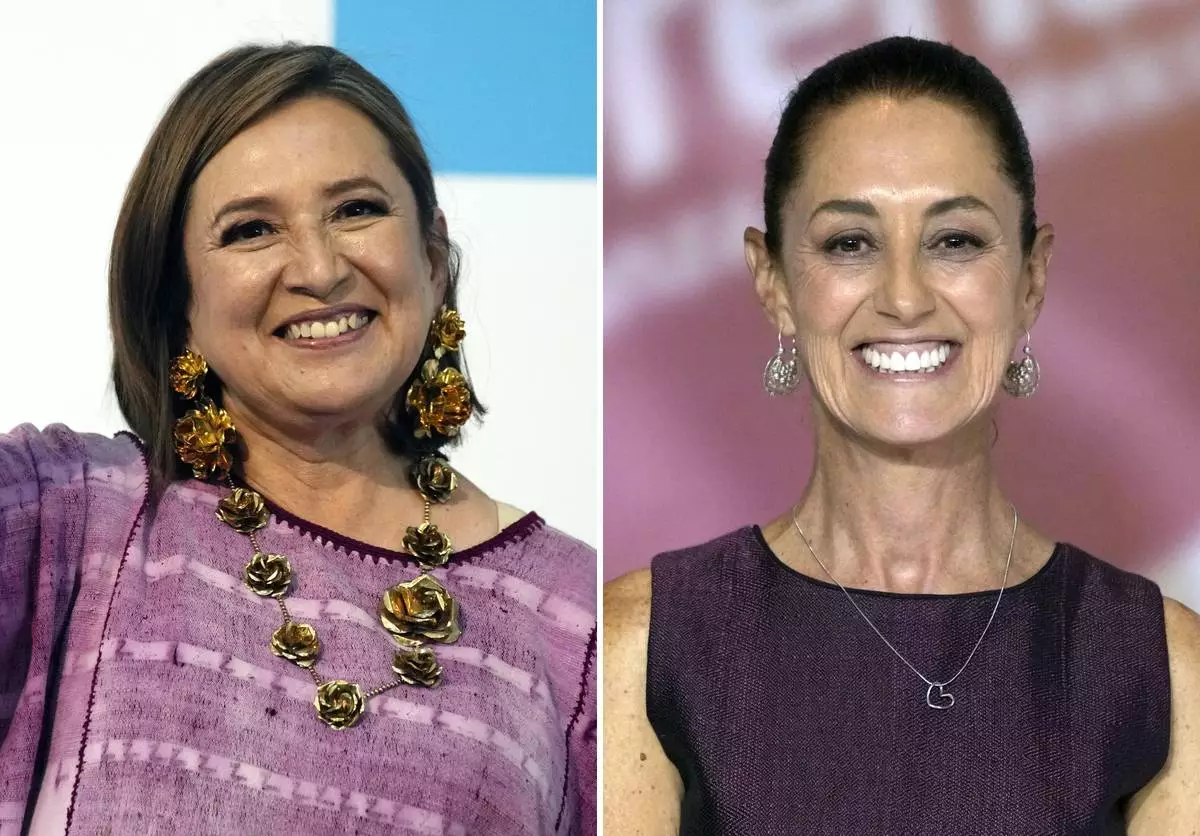
FILE - This combination of two file photos shows Xochitl Galvez, left, arriving to register her name as a presidential candidate on July 4, 2023, in Mexico City, and Claudia Sheinbaum, right, at an event that presented her as her party's presidential nominee on Sept. 6, 2023, in Mexico City. The two women, considered the frontrunners in Mexico's presidential election, discussed social spending and climate change in the race's second debate Sunday, April 28, 2024, which also included Jorge Álvarez Máynez. (AP Photo/Fernando Llano, File)
TBILISI, Georgia (AP) — Georgia’s president on Saturday vetoed the so-called “Russian law” targeting media that has sparked weeks of mass protests.
The legislation would require media and non-governmental organizations to register as “pursuing the interests of a foreign power” if they receive more than 20% of their funding from abroad. Critics of the bill say it closely resembles legislation used by the Kremlin to silence opponents, and that it will obstruct Georgia’s bid to join the EU.
President Salome Zourabichvili, who is increasingly at odds with Georgia’s ruling party, said on Saturday that the legislation contradicts Georgia’s Constitution and “all European standards,” and added that it “must be abolished.”
The ruling party, Georgian Dream, has a majority sufficient to override Zourabichvili’s veto, and is widely expected to do so in the coming days.
The Georgian government insists that the proposed law is intended to promote transparency and curb what it deems harmful foreign influence in the country of 3.7 million. Many Georgian journalists and campaigners fiercely dispute this characterization, saying they are already subject to audit and monitoring requirements. They say that the bill's true goal is to stigmatize them and restrict debate ahead of parliamentary elections scheduled for October.
The EU offered Georgia candidate status last December, while making it clear that Tbilisi needs to implement key policy recommendations for its membership bid to progress. The recommendations concern, among other areas, elections that must be remain free and fair, fighting disinformation “against the EU and its values," and safeguarding the independence of public institutions such as the central bank and anti-corruption bodies.
The opposition United National Movement and many protesters accuse Georgian Dream of trying to scupper the EU integration process, and to instead drag Georgia into Russia’s sphere of influence — allegations the ruling party vehemently rejects. Georgian Dream was founded by Bidzina Ivanishvili, a former prime minister and billionaire who made his fortune in Russia.
The bill is nearly identical to one that the party was pressured to withdraw last year after street protests. Renewed demonstrations have rocked Georgia for weeks, with demonstrators scuffling with police, who used tear gas and water cannons to disperse them. An opposition lawmaker earlier this month spoke in Parliament with a bandaged face, visible bruises and cuts. His allies said he had been assaulted by police during the protests.
EU officials and Western leaders have repeatedly expressed concerns over the law, as well as Tbilisi's heavy-handed response to dissent. The EU's top diplomat, Josep Borrell, issued a statement Wednesday in support of the Georgian protesters, and to condemn what he described as a wave of violence against opposition politicians, activists, journalists and their families.
European Council President Charles Michel said Tuesday that if Georgians “want to join the EU, they have to respect the fundamental principles of the rule of law and the democratic principles.”
Zourabichvili told The Associated Press in an interview Thursday that it was hard to say whether the bill was Georgian Dream’s initiative or if Moscow had played any role in its passage, but she emphasized that the Kremlin is unhappy with Georgia’s pro-Western aspirations.
“It’s clear that Moscow is not seeing with lots of appreciation this accelerated pace of Georgia towards the European Union,” she said.
Russia-Georgia relations have been strained and turbulent since the 1991 collapse of the Soviet Union and Georgia’s departure from its role as a Soviet republic.
In 2008, Russia fought a brief war with Georgia, which had made a botched attempt to regain control over the breakaway province of South Ossetia. Moscow then recognized South Ossetia and another separatist province, Abkhazia, as independent states and strengthened its military presence there. Most of the world considers both regions to be parts of Georgia.
Tbilisi cut diplomatic ties with Moscow, and the regions’ status remains a key irritant even as Russia-Georgia relations have improved in recent years.

Georgian President Salome Zourabichvili gestures while speaking during an interview with The Associated Press, in Tbilisi, Georgia, Thursday, May 16, 2024. Zourabichvili said Thursday that a "foreign influence" bill passed by parliament that critics call a threat to free speech is "unacceptable." (AP Photo/Shakh Aivazov)




